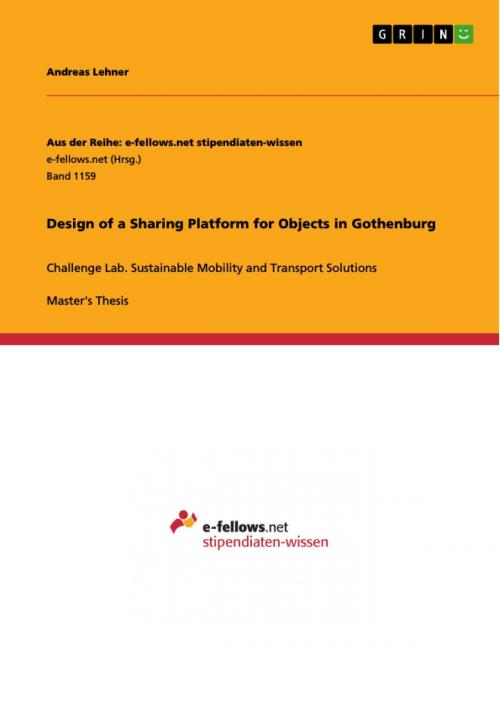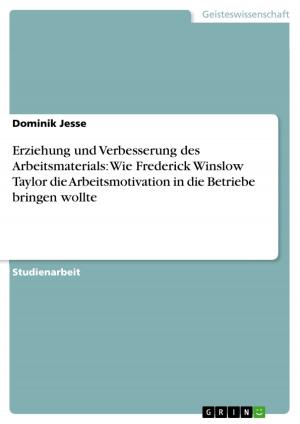Design of a Sharing Platform for Objects in Gothenburg
Challenge Lab. Sustainable Mobility and Transport Solutions
Nonfiction, Science & Nature, Science, Physics, Energy| Author: | Andreas Lehner | ISBN: | 9783656962380 |
| Publisher: | GRIN Verlag | Publication: | May 18, 2015 |
| Imprint: | GRIN Verlag | Language: | English |
| Author: | Andreas Lehner |
| ISBN: | 9783656962380 |
| Publisher: | GRIN Verlag |
| Publication: | May 18, 2015 |
| Imprint: | GRIN Verlag |
| Language: | English |
Master's Thesis from the year 2014 in the subject Energy Sciences, grade: 1, Chalmers University of Technology Foundation Göteborg (Sustainable Energy Systems), language: English, abstract: This thesis consists of two parts. Part I describes the Challenge Lab method, which is a method developed at Chalmers for students to utilize their creativity to come up with innovative solutions for a change towards a more sustainable society. The Challenge Lab was carried out between January and June 2014 by 12 graduate students from seven countries. It used several tools, perspectives, theories and frameworks that should enable the students to act as change agents between academia, public and private sector by introducing solutions for a sustainable transport system. Amongst other methods, the Challenge Lab included dialogue tools, value and leadership workshops, design thinking and backcasting. In Part II of this thesis, a system to reduce the environmental impact of each individual, called a sharing economy, is described and a convenient and accessible technological solution to implement in the public space is illustrated. Through practical methods such as workshops and participation in the Gothenburg Startup Hack a prototype of a smart box was developed. This system could provide a convenient and accessible solution by offering a service similar to public lockers, which can be opened by using a web service and would be at accessible places in public spaces (bus stops, etc.). During the process a possible partnership with a project in Gothenburg, called 'ElectriCity', was identified and could be developed further on after the end of this thesis. The main barrier of the sharing economy for reaching a mass-market was found to be trust amongst the individuals using the sharing platform. Several possible solutions to provide a trust-worthy service were identified and will be presented in the thesis. These include, amongst others, an insurance pool and a review system.
Master's Thesis from the year 2014 in the subject Energy Sciences, grade: 1, Chalmers University of Technology Foundation Göteborg (Sustainable Energy Systems), language: English, abstract: This thesis consists of two parts. Part I describes the Challenge Lab method, which is a method developed at Chalmers for students to utilize their creativity to come up with innovative solutions for a change towards a more sustainable society. The Challenge Lab was carried out between January and June 2014 by 12 graduate students from seven countries. It used several tools, perspectives, theories and frameworks that should enable the students to act as change agents between academia, public and private sector by introducing solutions for a sustainable transport system. Amongst other methods, the Challenge Lab included dialogue tools, value and leadership workshops, design thinking and backcasting. In Part II of this thesis, a system to reduce the environmental impact of each individual, called a sharing economy, is described and a convenient and accessible technological solution to implement in the public space is illustrated. Through practical methods such as workshops and participation in the Gothenburg Startup Hack a prototype of a smart box was developed. This system could provide a convenient and accessible solution by offering a service similar to public lockers, which can be opened by using a web service and would be at accessible places in public spaces (bus stops, etc.). During the process a possible partnership with a project in Gothenburg, called 'ElectriCity', was identified and could be developed further on after the end of this thesis. The main barrier of the sharing economy for reaching a mass-market was found to be trust amongst the individuals using the sharing platform. Several possible solutions to provide a trust-worthy service were identified and will be presented in the thesis. These include, amongst others, an insurance pool and a review system.















